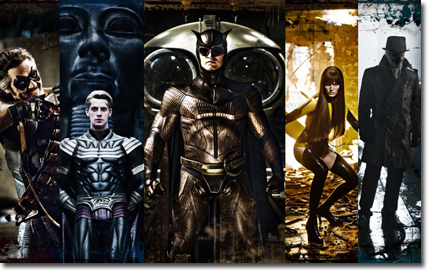|
To give
credit where credit is due, the film is visually stunning. The look is true to
the original comics, with actors chosen to resemble their comic book characters,
and carefully-crafted costumes and gadgets. The special effects are also mostly
top notch. The actors did a reasonably good job, too, and the major story arc
from the comics was even largely preserved. In fact, many of the scenes in the
film are lifted straight from the panels of the comic books.
This sounds pretty good,
right? So why isn’t this film more enjoyable? There are many factors undermining
the power of the original work. One of the first things that threw me was the
wretched soundtrack, with painfully obvious song choices taking me right out of
the story whenever they imposed themselves. I actually like Simon & Garfunkel,
but I don’t need to hear “The Sound of Silence” in a movie ever again. The worst
moment, however, is Leonard Cohen’s “Hallelujah” (another good song) playing
during what is surely the most ridiculous, embarrassing sex scene in the history
of cinema. In the comics, the scene is tasteful and touching.
 Just like the film version of V for Vendetta, another (better) Moore
adaptation, this film is chock-full of excessive, graphic violence. Scene after
scene of appropriate violence in the comics, often taking place off-panel, is
stretched out and made explicit, or changed altogether to be more disgusting.
There was no need for the filmmakers to pander to those who get off on gruesome
gore. The greatly extended, hopped-up fight scenes are also a major contributing
factor to the unwieldy length of this 2 hour and 43 minute monstrosity.
Just like the film version of V for Vendetta, another (better) Moore
adaptation, this film is chock-full of excessive, graphic violence. Scene after
scene of appropriate violence in the comics, often taking place off-panel, is
stretched out and made explicit, or changed altogether to be more disgusting.
There was no need for the filmmakers to pander to those who get off on gruesome
gore. The greatly extended, hopped-up fight scenes are also a major contributing
factor to the unwieldy length of this 2 hour and 43 minute monstrosity.
And although the
characters do largely resemble their comic book counterparts, the female lead,
the Silk Spectre, is of course younger and sexier. (Nite Owl, on the other hand,
is still sporting some middle-aged paunch.) Bowing to political correctness, the
Silk Spectre also could not be allowed to keep her smoking habit, as she is one
of the more sympathetic of the protagonists. Smoking is bad, you see, and good
people do not smoke. Whatever. But in the comics, the Silk Spectre is wanting to
light a cigarette when she accidentally sets off the flamethrower in Nite Owl’s
airship; in the film, as she doesn’t smoke, she sets it off for no reason at
all.
Many of the little
touches of humour scattered throughout the comics did not make it onto the big
screen. Much of the humour is lost because it is provided by supporting
characters who were cut entirely from the film. This might seem a minor point
given that the major story arc is largely intact, but it very much affects the
tone of the story. For these and other reasons, whereas the comics are engaging,
even uplifting despite the darkness of the material, the movie left me feeling
pretty empty.
|

